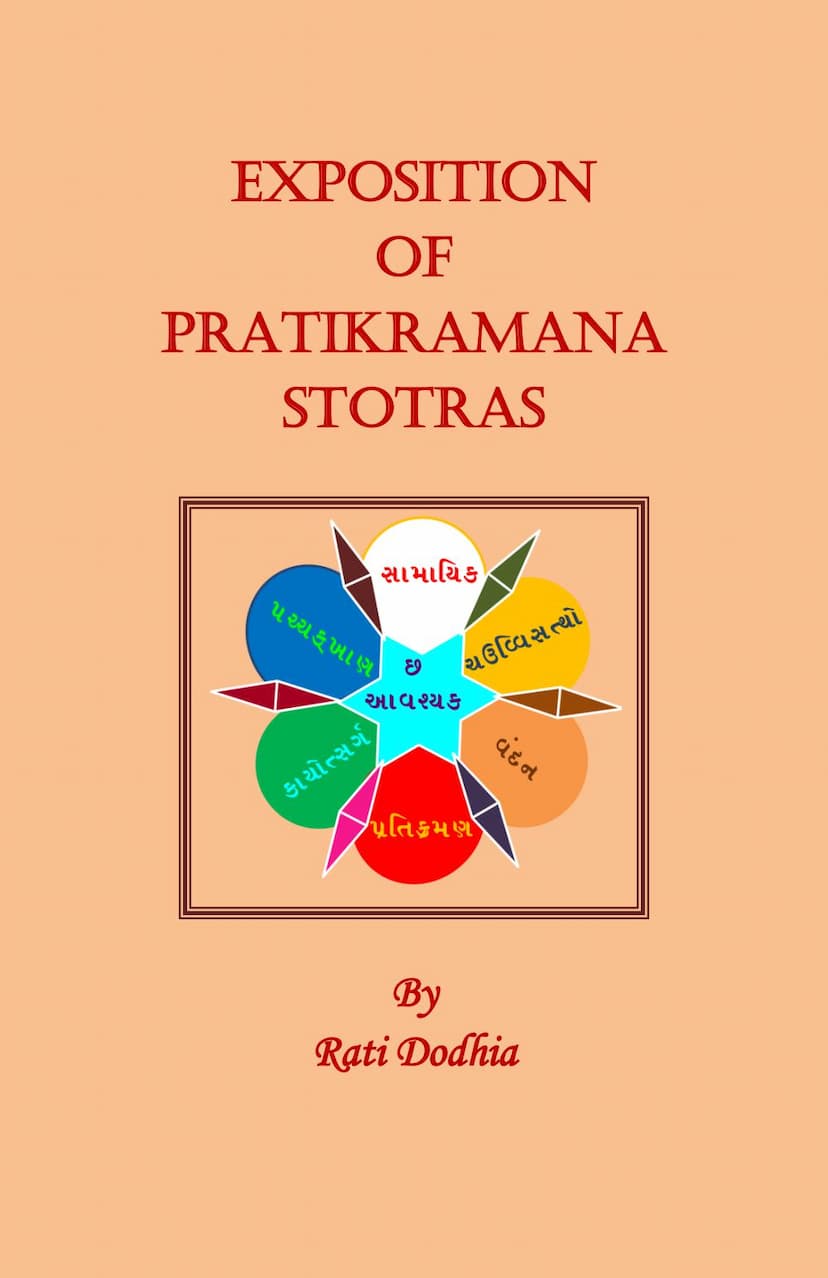Exposition Of Pratikramana Sutra
Added to library: September 1, 2025

Summary
This book, "Exposition of Pratikramana Stotras" by Rati Dodhia, is a comprehensive English translation and explanation of the Pratikramana Stotras, which are sacred hymns central to the daily duties of a Jain householder. The author aims to make these ancient texts accessible to a wider audience by providing simple English interpretations, as many devotees are not fluent in Sanskrit and Prakrit, the original languages of the sutras.
The book outlines the six essential duties prescribed for Jaina householders:
- Sāmāyika: Practicing unbroken meditative equanimity.
- Chaturvimashati Stava: Eulogizing the 24 Tirthankaras.
- Vandanaka: Veneration of ascetics.
- Pratikramana: Confession and atonement for past misdeeds through hymn recitation.
- Pratyäkhyäna: Self-denial and abstaining from future faults.
- Käyotsarga: Abandonment of the body for a limited time, often through meditation.
The book then systematically breaks down and explains numerous Pratikramana Stotras, providing the original verses (often in Gujarati script with English transliteration), their meaning, and a detailed explanation. Each stotra serves a specific purpose within the Pratikramana ritual, such as:
- Namukkāro Suttam (Navakāra Mantra): Salutations to the five supreme beings (Arihanta, Siddha, Acharya, Upadhyaya, Sadhu), considered the most auspicious mantra.
- Panchindiya Sutra: Praising the spiritual master and outlining their 36 attributes.
- Khamāsamaṇa Sutra: Paying respect to the spiritual master and seeking forgiveness.
- Ichchhakāra Sutra: Inquiring about the welfare of the spiritual master.
- Abbhutthio Sutra: Asking forgiveness from the spiritual master for any disrespect.
- Iriyāvahiyam-Āiryāpathiki Sutra: Seeking forgiveness for injuries caused to living beings while moving.
- Tassa Uttari Sutra: Making additional efforts to purify the soul.
- Ānnattha–Āgāra Sutra: Describing exceptions and time limits for Käyotsarga.
- Logassa Sutra: Eulogizing the 24 Tirthankaras of the current time cycle.
- Karemi Bhante Sutra: A vow to perform meditation and give up harmful activities.
- Sāmāiya Vayjutto Sutra: Asking forgiveness for any repeated harmful activities during Sāmāyika.
- Jagachintamani Chaityavandan Sutra: Veneration of Jain temples and images.
- Jävanti Cheiäim Sutra: Obeisance to images of Jinas in all three worlds.
- Jävant ke vi Sähu Sutra: Paying respect to all monks.
- Namorhat Sutra: Paying respect to the five supreme beings.
- Uvasaggaharam Stavana Sutra: A hymn to ward off worldly and spiritual obstacles, particularly praising Lord Parshvanatha.
- Jaya Viyaraya Sutra: Prayers for spiritual progress and detachment.
- Arihantacheiyānam Sutra: Adoring Jina images with faith.
- Kallāna Kandam Sutra: Adoration of Tirthankaras, Holy Writ, and Goddess of Learning.
- Sansäradävä Stuti: Praising Lord Mahavira, Tirthankaras, and Goddess of Learning.
- Pukkharavaradivaddhe Sutra: Praise of the Jaina doctrine.
- Siddhänam Buddhänam: Homage to Siddhas and enlightened beings.
- Veyävachchagaränam Sutra: Reverence to guardian deities.
- Bhagawänham Sutram: Veneration of all five supreme beings, emphasizing oneness.
- Devsia Padikkamane Thäum Sutra: Confession for sins committed during the day.
- Ichchhämi Thämi Sutra: Asking forgiveness for violations of layperson's vows.
- Nānammi Sutra: Praying and asking forgiveness for violations of five ethical codes.
- Suguru Vandana Sutra: Paying respects to spiritual preceptors and asking forgiveness.
- Devasiam Äloum Sutra: Bringing daily transgressions to light for forgiveness.
- Säta Läkha Sutra: Asking forgiveness for harm done to any living being, enumerating species.
- Adhära Päpasthänaka Sutra: Contemplating and asking forgiveness for 18 categories of sins.
- Vandittu Sutra: The principal aphorism for confession of transgressions of vows.
- Āyaria Uvajjhäe Sutra: Prayer of forgiveness towards spiritual guides and all beings.
- Sua Devaya Stuti, Kshetra Devatä Ni Stuti, Kamala Dala Stuti: Hymns of praise to Goddess of Learning, Guardian Deity of Space, and Sarasvati Devi.
- Namostu Vardhamänäya Sutra, Vishäla Lochana Sutra: Praises for Lord Mahavira and other Tirthankaras.
- Varakanaka Sutra: Praise for the 170 Pathfinders.
- Chaukkasaya Sutra: Praise for Lord Parshvanatha.
- Mannaha Jinänam Sajjhäya Sutra: Description of 36 essential duties of a layperson.
- Bharahesara Sajjhäya: Eulogy of great past virtuous individuals.
- Sakala Tirtha Vandanä Sutra: Obeisance to all sacred places and images.
- Laghu Shänti Stava Sutra: Praise of Lord Shantinatha for peace.
The book also includes explanations on key Jain concepts like the five vows, three restraints, five vigilance practices, and the different types of austerities. It emphasizes the importance of clear pronunciation, melodious recitation, and sincere intention while performing these duties. The author concludes by seeking forgiveness from the readers for any unintentional misinterpretations, inviting suggestions for future editions.